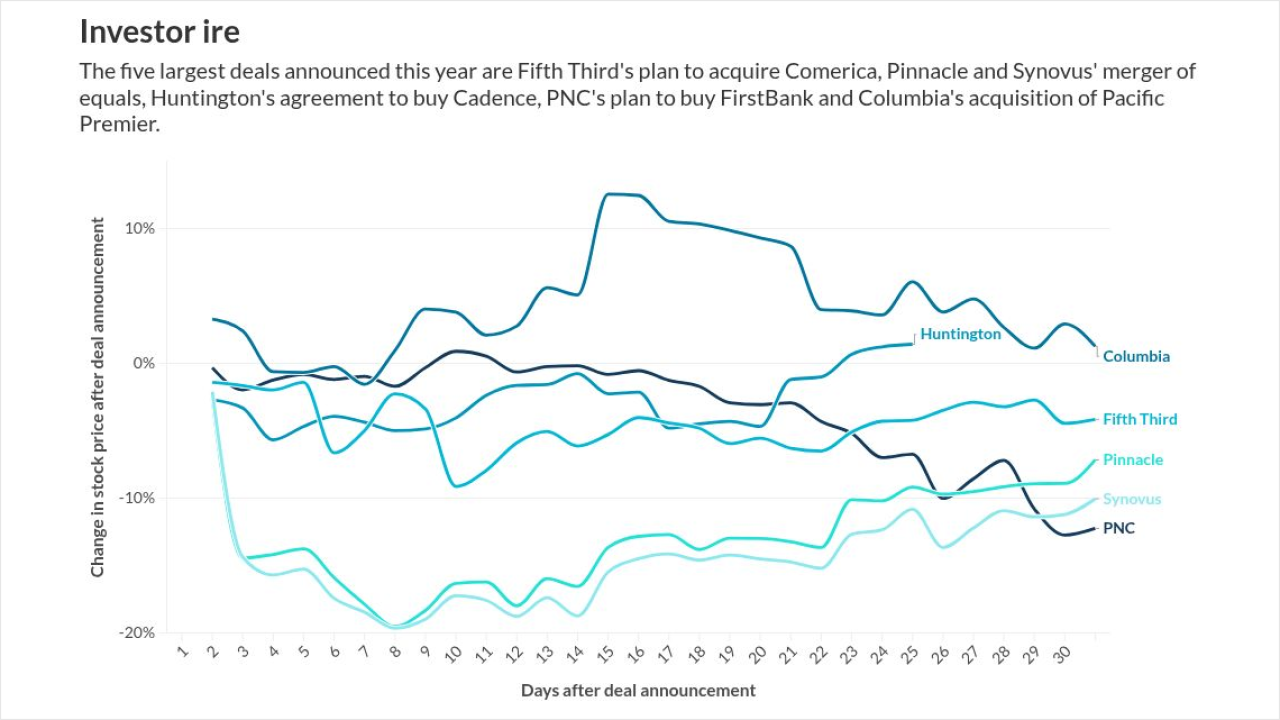After
The good news is that after Silicon Valley Bank deposits declined by roughly $12 billion in the first two-and-a-half weeks after the acquisition, they appear to be stabilizing. In the past four weeks, deposits from the collapsed bank have hovered in the $41 billion range.
"We continue to focus on client outreach," Peter Bristow, the bank's president, told analysts during its first-quarter earnings call. He expressed confidence that some of Silicon Valley Bank's old clients will move their money back as they realize their deposits are safe at First Citizens.

But First Citizens does not believe the outflows are over, either. It expects another $8 billion of deposits to run off between now and the end of the year. That's because SVB clients — including fast-growing startups and technology companies —
To counteract the outflows, First Citizens is using its nationwide online bank, CIT Bank, to "quickly add balances through competitive offerings," Bristow said. Excluding deposits tied to Silicon Valley Bank, the company's deposits have increased by about $2.6 billion since the end of March, in large part because of higher rates being offered at CIT Bank.
On Wednesday, CIT Bank was offering a 5% annual percentage yield on a six-month certificate of deposit, among the highest rates available at Bankrate.com.
First Citizens expects that additional Silicon Valley Bank outflows will be offset by approximately $10 billion of deposit growth at its direct bank, Chief Financial Officer Craig Nix said during the call.
It's been just over six weeks since Raleigh, North Carolina-based First Citizens purchased all of SVB's customer deposits, substantially all its loans and certain other assets of the failed bank from the Federal Deposit Insurance Corp. The FDIC had set up a bridge bank to protect depositors following SVB's swift and turmoil-inducing
The deal expanded the scale and geographic reach of First Citizens, which has now completed
In total, the acquisition included $106 billion of assets, doubling the size of First Citizens, which had $214.7 billion of assets as of March 31. First Citizens bought $68.5 billion of loans, $35.3 billion of cash and interest-earnings deposits at banks and nearly $57 billion of customer deposits, which shrunk to $41.4 billion by May 5, the company said.
Like New York Community Bancorp, which
"While it is early, we have seen initial positive results in the first clients we have contacted," Nix said Wednesday. He said the company is "cautiously optimistic" that deposit and loan runoff won't be as steep as predicted.
Growing core funding is one of First Citizens' top priorities going forward. So too is the retention of Silicon Valley Bank employees, especially "key revenue-generating employees and the staff to support them," said CEO Frank Holding Jr.
He acknowledged that there has been some turnover since the deal was announced, but expressed confidence that Silicon Valley Bank "has one of the deepest and most experienced benches of any financial institution serving the innovation economy." And he said that First Citizens is "committed to maintaining and growing [the bank's] market by leveraging this deep-seated talent and strength ..."
Though the Silicon Valley Bank acquisition has posed some funding challenges for First Citizens, it gave a large boost to the bank's profits during the first quarter.
First Citizens reported net income of $9.5 billion, up from $271 million during the year-ago period. The increase was the result of a preliminary gain on acquisition of $9.8 billion.
The bank reported $28 million of acquisition-related expenses during the quarter, with overall noninterest expenses totaling $855 million, up from $810 million during the first quarter of 2022. The company expects to incur expenses of between $4.2 billion and $4.3 billion for the full year, it said.
Before Silicon Valley Bank failed, its own noninterest expenses were about $2.6 billion annually, First Citizens said. Between 25% and 30% of that total is expected to fall off as a result of combining the two companies, including the consolidation of certain duplicate back-office operations, the company said.
First Citizens is still in the early stages of integrating Silicon Valley Bank, but it did report some progress on Wednesday. Company executives have held initial meetings with SVB leaders and innovation economy clients, and they have arranged firmwide town hall meetings and training sessions, First Citizens said in its first-quarter earnings presentation.
Analysts wanted to know if First Citizens is planning to use some of its capital, which now tops its targeted range, for share repurchases. The common equity Tier 1 ratio of the combined company is 12.53%, well above First Citizens' target of 9% to 10%.
Executives said it's too early to say whether they will use excess capital for buybacks. They are preparing a new capital plan that they expect to share with the board of directors in late July.






